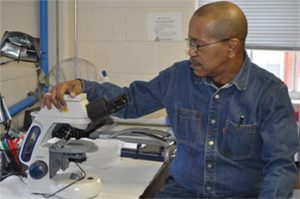About Us
About the Morehouse Scientific Literacy Center
About us

According to recent studies conducted by the Scientific Literacy Center on freshmen who declared science majors, half of these students scored 65% or lower on a scientific literacy test. Students with a low scientific literacy score may not possess adequate STEM competencies required to be successful in a science major. This study further suggests that many students possess a deficiency in the understanding of scientific literacy concepts that may lead to disenfranchisement with their STEM major in the first year of college, resulting in a lack of success and eventual withdrawal from his/her major.
The Center attempts to address these challenges by offering:
- a scientific literacy curriculum with PowerPoint presentations, lectures, case studies and teaching notes;
- a scientific literacy assessment instrument that identifies deficiencies in STEM competencies of scientific literacy (i.e., conceptual understanding, knowledge base, skill sets, scientific reasoning, quantitative literacy, attitudes, behaviors, and self-efficacy);
- a searchable database of information on more than 150 STEM occupations and 90 STEM professional and trade organizations;
- a video archive of interviews with STEM professionals highlighting their careers in STEM and video clips on selected STEM professions; and a
- digital library with resource links for STEM-related information including but limited to articles, papers, publications, reports, benchmarks, charts and graphs.
Mission/Goals
The mission of the Scientific Literacy Center is to increase the scientific literacy of freshman STEM majors, as well as high school students that are interested in STEM. This mission includes: promoting student knowledge, interest and successful pursuit of STEM majors; enhancing student cognitive and non-cognitive skills needed for success in the STEM major; providing a scientific literacy curriculum that is specifically designed to increase STEM retention; promoting increased student awareness of career opportunities in STEM; providing a scientific literacy assessment; and studying this instrument to continue to research the scientific literacy of freshman STEM majors.
The goal of the Center is to be a “one-stop-shop” for scientific literacy related information for:
- all freshmen who are majoring in science, technology, engineering and mathematics (STEM);
- high school students who are interested in majoring in STEM; and also
- college faculty members, high school teachers and counselors.
Why is Scientific Literacy Important?
